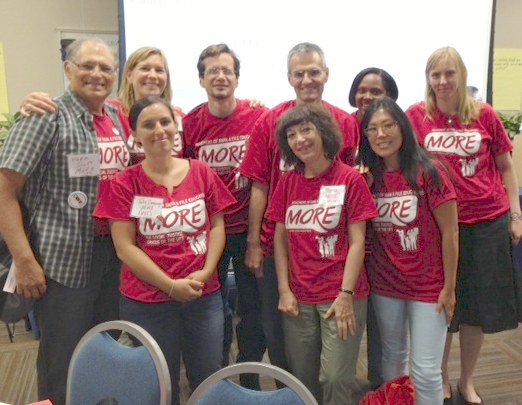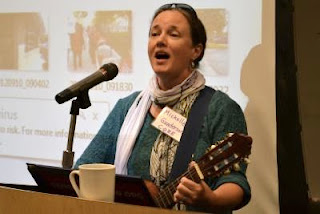 |
| Moi, Yelena, AJ, James, Camille, Megan, Julie, Gloria, Jia (Sean caught a flight) |
I have so much to say about the trip to Chicago I made with a big crew from MORE this past weekend but so much of it would be boring -- like you don't really want to know just how much beer I drank. And how much fun it was to hang out with year old Jack who can now make animal sounds upon prompting -- my fave was the snorting pig.
And the entire Eterno family was present -- Kara is 4 already? Jeez. James, nearing retirement in a few years will be having a hell of a lot of fun as full-time nanny. They are staying for a few extra days of vacation. To me having Julie and Jack and James, Camille and Kara present made the weekend special. (I was thinking that 2 years ago when we were there Jack wasn't even a gleam in the eye --- well, maybe a gleam.)
 |
| Guess: Which is the statue? |
But this was serious business with people coming from all over the nation. I learned so much -- about how the CTU uses social media from their expert Kenzo Shibata who I first met in 2009. And the struggles of teachers from other cities and states --- so much that if I tell you some of it I would have to kill you. And you all know what a blabbermouth I am. So I am trying hard to stfu.
I did some video of the Friday night presentations of Karen Lewis, Julie Cavanagh and reps from Newark, Seattle and Chicago. I will post them later. (Funny but I did post them for conf attendees and got some blow back that I should edit out a few words here and there that might get some people in trouble. Given the attacks on teachers, there is increasing paranoia that may just be justified.)
To me this is not yet as much about as forming a national movement of social justice oriented unions, caucuses, individuals, etc. as it is about the first stage of such a movement -- networking and gaining trust in each other.
I am actually getting tired of the term "social justice" which is getting overused. It comes across to me as sloganeering instead of clearly stating what it is you want to do. Both at this conf and at MORE events there is a sense we have to sell the idea of SJ to people. Don't sell the term, just do it -- like build alliances with parents instead of trying to convince people that it is important. Show results like they did in Chicago. OK. Off soap box.
For me this was the 3rd time doing something like this -- 2009 in LA with 5 cities, 2011 in Chicago with about 200 people and this time. So we get to know more and more people around the nation. Two years ago few people knew Julie. Now she is on the national steering committee and played a role in organizing this.
Many encounters are accidental -- like where you happen to sit down. I was sitting next to an LA teacher union activist and learned a lot about the LA story, where Alex Caputo-Pearl is running for union president, a very exciting idea -- Alex had a bunch of us over to his house for breakfast back in 2009 and is one of the most dynamic teachers I've met. I
wrote about Alex and linked to a number of pieces about him not long ago. Alex is TFA, class of 1990.
Sunday morning I went to get coffee and ran into Bob Peterson, president of the Milwaukee Teachers Education and also founder of the social justice pillar, "
Rethinking Schools," one of the most important journals for progressive teachers (which everyone should subscribe to and support). We had coffee together and I got to know a bit about him. That he has 2 daughters living in Brooklyn and visits regularly --- can't wait to get him to speak at a MORE event. I consider Bob a great educator -- a real teacher and now a union leader. With the attacks on Wisconsin teachers there is a good chance the NEA and AFT will merge in that state, which would be a good thing and bring in some progressive forces into the AFT.
And I had a brief Fred Klonsky citing but then had to go prep for a presentation I was co-giving with a CORE member so never got to chat with him. Actually, Fred has kids living in Brooklyn too and what a double treat it would be to get him and Bob together one day in Brooklyn.
At the Sat. night party I sat down with teachers from Philadelphia and we talked about how we can support each other. Also teachers from Newark's NEW Caucus who we hope to get together with real soon to chat about everything -- and what an impressive crew they are.
Next July the AFT convention is in LA and some of these people will be there. Will it be as an organized force to pressure the AFT leadership to resist ed deform more firmly? I do not see this movement presenting a challenge to Randi/Unity control of the AFT but more as a working within to get more locals to call for MORE from the AFT. If I am healthy and my house is not under 10 feet of water I will try to be there.
I may write some more about the weekend -- after I check with the censors.
I met Michelle Gunderson from CORE a year ago at SOS in DC. She helped run the entire weekend and was one of the many CORE people we met who just seem so knowledgeable and competent at whatever they do. And what they are doing is organizing in Chicago to bring parents and people together to fight the mean Rahm machine.
Here is a brief report from Samantha Winslow from Labor Notes, which
played a big role in supporting and organizing the conference.
http://www.labornotes.org/blogs/2013/08/chicago-teacher-organizing-lessons-go-national
Chicago Teacher Organizing Lessons Go National
 “Woke up this morning with my mind on education,” sang Michelle Gunderson, one of the organizers of a conference that brought teachers from around the country together to strategize. Photo: Samantha Winslow.
“Woke up this morning with my mind on education,” sang Michelle Gunderson, one of the organizers of a conference that brought teachers from around the country together to strategize. Photo: Samantha Winslow.
Teachers from across the U.S. gathered in Chicago over the weekend to share strategies for strengthening their unions to battle the seemingly never-ending attacks on public education.
A conference for social justice unionism, the host organizers called it. They were from the Chicago Teachers Union’s Caucus of Rank and File Educators (CORE). Many teachers see the group, which won office in 2010 and led last fall’s nine-day strike, as a model.
CORE and many other participants emphasized that teachers have to ally with their students and communities to advocate for quality public education—and show the public that “the people who care about your children are working with your children,” said CTU President Karen Lewis. “They are not in the state capitals.”
Teachers and union leaders from Chicago, Newark, St. Paul, New York, Los Angeles, and other cities were abuzz. They got down to nuts and bolts—everything from how to get parents involved at the school site, to how to talk to your co-workers, to how to fight mayoral control. And they talked about such big-picture questions as, “How do we combine bread-and-butter union issues with social justice and education justice?”
“CORE was definitely a blueprint for other caucuses around the country and the world,” said Shannon Coleman, who came with a group from Newark, New Jersey. “I was really in awe to see how they organized their members and aligned their members with the community, how they got a majority of their members involved.”
Coleman is on the steering committee of the NEW caucus, which recently won a majority of seats on the Newark union’s executive board. Seeing how many teacher groups share similar goals, “it clicked for me that this was the mission of our caucus,” Coleman said. “I could see what type of movement was starting to build.”
Tide Turning
“The tide is turning” against corporate attacks on teachers and public education, Lewis declared to loud applause, as she welcomed the more than 100 teachers on Friday.
The conference included panel discussions on running for union office, organizing with community members and parents, strategic political action, research to advance union struggles, and media and communications strategies.
CORE hosted a similar conference in 2011.
Nick Faber, an officer at the St. Paul Federation of Teachers in Minnesota, said his union has been inviting parents and community members to attend bargaining sessions this year, to show how their interests are aligned.
The union has modeled some of its strategies after CTU’s. The influential 2012 report The Schools Chicago Children Deserve was a template for a similarly named St. Paul report about the union’s and the community’s education priorities. At least a half-dozen teacher groups at the conference said they were working on similar reports for their own cities.
“What we can see from the conference is that there is already an incredible amount of social justice union activism, at the grassroots level, in locals across the country,” said CORE leader Xian Barrett, who helped plan the conference.
Last year’s strike in Chicago resonated even around the world. Lewis brought a surprise guest: Beth Davies, president of the National Union of Teachers in the U.K. Its 350,000 members in England and Wales are preparing for a national strike. They too were inspired by CTU.
No Reinventing
Collaboration and support among union locals and caucuses was a repeated theme. “We need to think about how we work together so we are not constantly reinventing the wheel,” Lewis said.
As the conference began, Philadelphia’s superintendent was announcing that a budget shortfall might keep the district from starting the school year on time next month. Teachers in both Chicago and Philly have fought massive layoffs and school closures this year.
“The lesson from Philadelphia and Chicago is that, even with strong [local] union activists, it is not enough to defeat the corporate education reform efforts,” Barrett said. But if we come together and collaborate we can win.”
Teachers concluded by discussing ways to collaborate: on national education policy, the overemphasis on testing, working with parents, and getting more teachers involved in union campaigns.
They also compared notes on the upcoming March on Washington. Working with National Nurses United and other organizations in Chicago, CTU is organizing a group to travel to D.C. for the 50th anniversary of 1963’s famous March for Jobs and Freedom.
In the spirit of the original march, which called for jobs and racial justice, organizers want to raise those issues again—this time highlighting school closings, foreclosures, and the recent acquittal of George Zimmerman, who shot and killed unarmed African-American teenager Trayvon Martin and sparked national outrage. Teachers union leaders in D.C. also plan to participate in the march, as will many other national and local unions.
And it wouldn’t be a labor event in Chicago without a visit to the Haymarket Memorial, where students performed a series of readings to commemorate the events at Haymarket Square. Conference organizer Michelle Gunderson urged teachers to remember the fight for an eight-hour work day and their role in labor history.
Modifying a civil rights movement hymn, she sang in one conference session, “Woke up this morning with my mind on education.”
Samantha Winslow is a staff writer and organizer with Labor Notes.samantha@labornotes.org
- See more at: http://www.labornotes.org/blogs/2013/08/chicago-teacher-organizing-lessons-go-national#sthash.jRito7A2.dpuf





